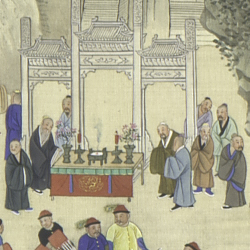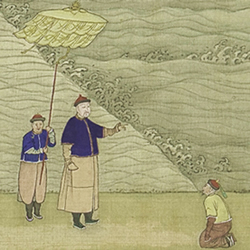I. Teachers’ Guide
Qing State
Study Questions:
- Explain the concept of the "Mandate of Heaven".
- How did this differ from the concept of the "divine right of kings" in Western Europe, for example?
- What are the pros and cons of the two concepts in terms of their implications for political power?
- How did the Qing use the concept of the "Mandate of Heaven" to justify their overthrow of the Ming dynasty?
- Can you explain why the Qing continued to pay homage to the Ming emperors through ritual veneration?
- How did this reinforce the concept of the Mandate of Heaven?
- Look at the scroll depiction of the Kangxi emperor arriving at Mt. Tai.

Silk, Imperial Legitimacy and the Cosmic Order: The Kangxi Emperor's Visit to Mt. Tai
Interactive: Kangxi Emperor's Southern Inspection Tour, Scroll 3: Ji'nan to Mt. Tai
- What is the significance of Mt. Tai?
- What is the significance of the Kangxi Emperor’s stop at the mountain?
- How is it related to the concept of the "Mandate of Heaven"?
- Look at the portion of the scroll where the Qianlong Emperor is depicted inspecting work done along the banks of the rivers.

- Why would the Emperor have chosen to make a stop at this site?
- What is the significance of his being depicted overseeing the work?
- Explain how a hierarchically structured bureaucracy works. How do you think this supports centralized control by the imperial government in Beijing?
- What is a "meritocracy"?
- How does it differ from an "aristocracy"?
- What would be the implications for government?
- What function did the "examination system" serve in China?
- Explain how a Chinese bureaucratic might have "two loyalties" or two orientations when serving in the government.
- What are the pros and cons of this for the empire?
- How was the "rule of avoidance" related to this issue?
- Which European and American theorists were impressed by the Chinese system of government as they learned more about it?
- How was it similar to and different from government in Europe at this time?
- When were "civil service examinations" introduced in England? In France? In the United States?
- How much did the Chinese population increase during the period of the Qing dynasty?
- Did the size of the bureaucracy governing the country also increase?
- What were the implications of this?
- Explain the innovation in tax policy that occurred during the Qing
- How did
- Would you expect that the Chinese government would tax commerce and trade?
- Why?
- Are you right or wrong?
- What was the "secret palace memorial system"?
- What was its purpose?
- Do you think this is a good system or not?
- Can you think of other situations in contemporary times when such a system might be useful?
- What role does a "free press" play in this regard?